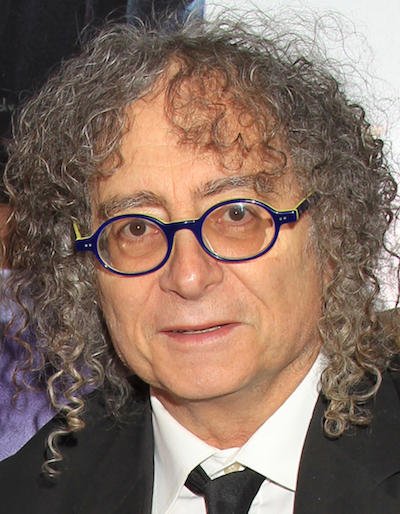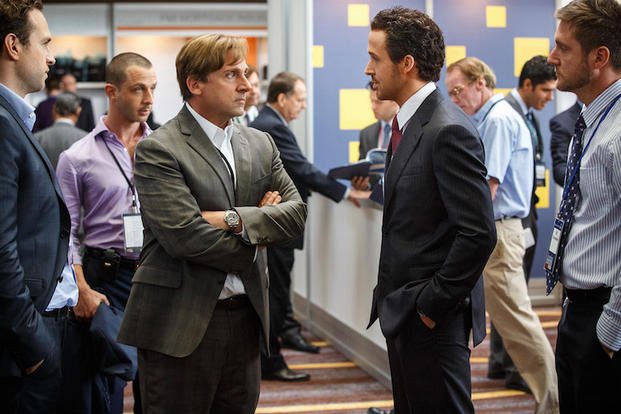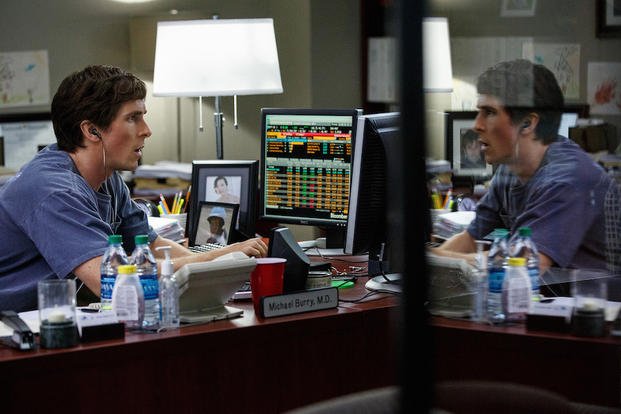The Big Short, the Oscar-winning movie about the 2008 financial crisis, is out now on Blu-ray, DVD and Digital HD. If that sounds boring, director Adam McKay (known for Talladega Nights and who talked to us about Anchorman 2 a couple of years back) had a plan to unravel incredibly complicated Wall Street terminology and tell a story in plain English. He enlisted a roster of movie stars (Brad Pitt, Christian Bale, Ryan Gosling, Steve Carell, Marisa Tomei and Finn Wittrock) to play his lead characters, brought in cameos from Margot Robbie, Selena Gomez and Anthony Bourdain to metaphorically explain the really complicated stuff and wrote (with Charles Randolph) an Oscar-winning screenplay based on Michael Lewis' best-selling book.
In many ways, this movie expands on the excellent (and hilarious) takedown of Wall Street shenanigans that played over the end credits of McKay's underrated The Other Guys. In a high-tension political year, The Big Short is a funny movie that explains why the game might be rigged and taps into the same frustrations that have made Donald Trump and Bernie Sanders so popular.
A big part of why the movie works so well is the (Oscar-nominated) editing by Hank Corwin. Corwin was the editor on Oliver Stone's Natural Born Killers, one of the most controversial and innovative movies of the '90s. He later cut Stone's Nixon and U Turn, Robert Redford's The Legend of Bagger Vance and The Horse Whisperer, and Terrence Malick's The New World and The Tree of Life. He took time out from his vacation to talk with us about cutting The Big Short and how he got into the movie business.

Editor Hank Corwin attends the New York Premiere of "THE BIG SHORT" from Paramount Pictures & Regency Enterprises, at The Ziegfeld Theater in New York, NY on Monday, November 23, 2015.
A lot of people who read the book thought it was impossible to make a movie out of it. You guys managed to pull it together and the editing of the film is a big part of why it works. How did you work with the screenwriters and the director to figure out how to tell the story?
Coming into it, I didn’t know anything about finance. I can't honestly say that I read the book in one sitting. I had real problems reading the book. I'm just not geared that way.
When I got the script, it was pretty amazing and it was very human. That was the stuff I was able to hold onto, the things that I could relate to.
When I was cutting it, I just started by trying to understand the characters. Ultimately, I had to see all the financial stuff through their eyes. In my own way, I had to sort of become the characters and just start thinking a little like them.
The on-screen explanations weren’t in the original script. Our director Adam McKay was unbelievable and we had a technical advisor named Adam Davidson, who is a financial writer. And I would call him and I would ask him to define tranches and stuff like that because it made no sense to me. He would give me these definitions and some of them were just so accurate that I just used them almost verbatim as the text on screen. Since it helped me understand who the characters were and what was going on, I figured it would probably help the viewer.
Looking at your work, it seems like you're one of the people who can think digitally as opposed to in terms of cutting strips of film and splicing them together. There's definitely a more complicated approach to how things can fit together than somebody who would have been doing this 40 or 50 years ago. Does that make sense?
Now we have random access. Film used to be about storytelling, someone going from point A to point B. Instead of thinking about somebody going from their house to the store, you have to start thinking in terms of whether the guy is thinking about his wife, the guy is thinking about the keys for his car, where did he put the keys, and the guy is driving and maybe he's thinking about the tire. Ultimately he gets to the store. It's just a richer way to look at filmmaking.
A lot of it has to do with working with computers. You have so much quicker access to all the material. You don’t have to necessarily scroll your film from one point – from the beginning to the end. You can grab pieces. The technology helped create a way of thinking.

Left to right: Steve Carell plays Mark Baum and Ryan Gosling plays Jared Vennett in The Big Short from Paramount Pictures and Regency Enterprises
There seems to be a change in how people's minds process information. If you go back 20 years to the films you did with Oliver Stone, you were early on this idea of different ways of processing information.
Well, I came from a different background. I didn’t start out as a feature film guy. I started as a runner in a commercial film house in New York City. When I was doing that, music videos were first starting and small independent films were finally getting some kind of acknowledgement.
I would get jobs on these videos because they had no money. Most of these directors didn’t really know what they were doing, which turned into a real blessing, because as an editor I was allowed to learn and to teach myself a whole different way of looking at film. And it was only then that I discovered that German impressionistic filmmakers in the 20's and the Russians and from the teens to the 30's were making amazing films that were very similar conceptually to what I was trying to do.
A lot of our readers aspire to careers in the movies after they get out of the military.If someone wants to do your job, how do they get to where you are? What's the best way to approach having a career as an editor?
I'm just trying to put it into words here. I didn’t know anybody. I got a job as a messenger in an editing company in New York. And it wasn’t even in films; it was in infomercials.
I was working for this assistant editor who – and this sounds really crazy, these were different times - he was a Puerto Rican guy who was afraid of the dark. We had to work around the clock. He would ask me to stay there with him because he didn’t want to be alone. I said, “Look, if you teach me how to sync dailies, of course I'll stay with you, but I just can't stay and do nothing.”
That’s the whole story. I just worked really hard and I was really lucky to be in the right place. But I started in a place that you wouldn’t expect to start. I remember running into a guy I went to high school with who was working on features and I told him what I was doing. He just turned to me and said, “You have no future and no chance whatsoever to get into movies."
So, in a way it's a good story. You can do it. I've got a company that makes commercials and it's so hard to find good kids who really want to work hard, who really love everything. Everybody seems to want the reward without wanting to get into the process.
You know so if you're a kid and you’re 21 or 22, find something, find anything, be willing to work for nothing. That’s what we did. A lot of people who really succeeded started out taking the jobs that nobody else wanted.




